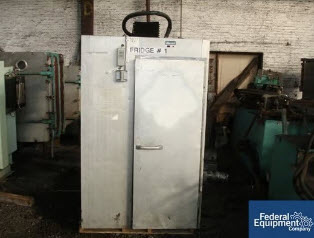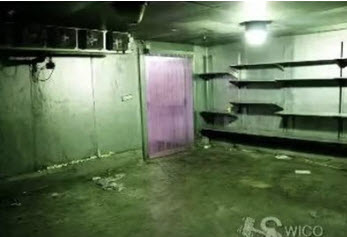The history of freezers is a testament to human innovation and the quest for food preservation. From ancient ice houses to modern, high-tech appliances, these devices have revolutionized the way we store and preserve perishable goods. This showcases the remarkable progress that has made refrigeration an integral part of our daily lives, ensuring the freshness and safety of our food supply. An industrial freezer is a big investment, so we’re covering everything you need to know and consider when buying one.
Popular Types of Commercial Freezers: Walk-In Freezers
Walk-in freezers are among the most popular types of commercial freezers, distinguished by their spacious interior and ability to store large volumes of products. Ideal for businesses with high-capacity storage needs, these freezers offer several benefits:
- Size Customization: Walk-in freezers come in various sizes and can be customized to fit specific space and storage requirements.
- Versatile Storage: They are adaptable, allowing for the storage of a wide range of products, from bulk food items to boxed goods.
- Temperature Control: Advanced temperature control systems ensure consistent cooling, vital for preserving the quality of stored items.
- Energy Efficiency: Many walk-in freezers are designed with energy efficiency in mind, reducing operational costs.
- Durability and Reliability: Built for commercial use, they are robust and designed to withstand heavy usage.
- Accessibility: Their walk-in design allows easy access and organization of stored items, improving operational efficiency.
These freezers are essential for businesses like large restaurants, grocery stores, and food processing facilities, where bulk storage at consistent temperatures is crucial.


What to Look for When Buying Walk-in Freezers
Purchasing commercial freezers is a significant investment for any business. To make an informed choice, consider the following factors:
- Available Space and Function: Consider the space where the freezer will be installed. Ensure enough room for the unit, including clearance for ventilation. The freezer’s function, whether for bulk storage or frequent access, also influences the size and design.
- Door Type: Door types vary, including sliding, swing, and bi-parting. Choose based on accessibility and space constraints. Insulated doors with heavy-duty hinges offer better temperature control.
- Cooling Capacity: Ensure the freezer meets your cooling needs. Larger spaces or higher ambient temperatures require more powerful cooling systems.
- Energy Usage: Opt for energy-efficient models to reduce operational costs. Check for ENERGY STAR ratings and energy consumption specifications.
- Compressor Location: Compressors can be top-mounted or bottom-mounted. Top-mounted units are more efficient in hot environments, while bottom-mounted units are easier to maintain.
- Refurbished vs New: Decide between new or refurbished units. New freezers offer the latest technology and warranties, while refurbished ones can be cost-effective but may have limited warranties.
- Aesthetics: Consider the freezer’s exterior design and how it fits into your space. While functionality is key, aesthetics can also be important, especially in customer-visible areas.
Applications for Industrial Freezers
Industrial freezers are essential across various industries, ensuring the safe storage and preservation of perishable goods. Here are some key applications:
- Restaurants and Bars: Restaurants and bars use industrial freezers for storing bulk food items and beverages. They help in maintaining the quality and freshness of ingredients, crucial for culinary businesses.
- Bakeries and Creameries: Freezers in bakeries and creameries are essential for preserving dough, creams, and dairy products. They ensure the longevity and quality of sensitive ingredients.
- Grocery Stores and Markets: Industrial freezers in grocery stores and markets offer large-scale storage for perishable goods, aiding in inventory management and reducing waste.
- Storage and Preservation: These freezers are key in long-term storage and preservation of food products, especially in bulk storage facilities and distribution centers.
- Hospitality: In the hospitality sector, industrial freezers play a vital role in catering and event management, providing ample space for pre-prepared meals and ingredients.
These applications highlight the versatility and importance of industrial freezers across various sectors. Whether for food preservation, product display, or specialized storage, these units play a crucial role in maintaining product quality and safety.
Other Refrigeration Equipment
In addition to freezers, several other components and equipment are crucial for maintaining efficient refrigeration systems in commercial and industrial settings:
- Compressors: Compressors are the heart of refrigeration systems. They compress refrigerant gases, raising their temperature and pressure before they release heat. This process is vital for cooling and refrigeration cycles.
- Condensers: Condensers play a crucial role in dissipating heat from the refrigerant. They remove heat from the compressed refrigerant, causing it to condense into a liquid state before it enters the evaporator.
- Chillers: Chillers are refrigeration systems designed for cooling processes or spaces. They’re commonly used in industrial applications, such as cooling machinery or maintaining consistent temperatures in large buildings.
- Cooling Towers: Cooling towers are heat rejection devices used to transfer excess heat from industrial processes to the atmosphere. They’re frequently used in conjunction with chillers for efficient cooling.
- Cooler Bases: Cooler bases or stands elevate refrigeration units, providing better airflow for ventilation and preventing moisture damage to the equipment.
- Refrigerants: Refrigerants are essential substances in the refrigeration cycle. Different refrigerants have varying properties, and the choice of refrigerant depends on factors like environmental regulations, energy efficiency, and system compatibility.
Each of these components contributes to the functionality and efficiency of industrial and commercial refrigeration systems. When selecting or maintaining refrigeration equipment, it’s essential to consider the specific requirements of the application and adhere to industry regulations and best practices.
Tips & Tricks
You won’t have much trouble finding a specific type of refrigeration equipment on Surplus Record. At the top of all the pages on our website, you’ll see a search bar. Type the phrase “Walk-In Coolers/Freezers” into it, click on the category that drops down, and examine the options we have available.
We also work with a variety of dealers who specialize in walk-in freezers. You can also find dealers in your area or by name who specialize in walk-in coolers and freezers.

